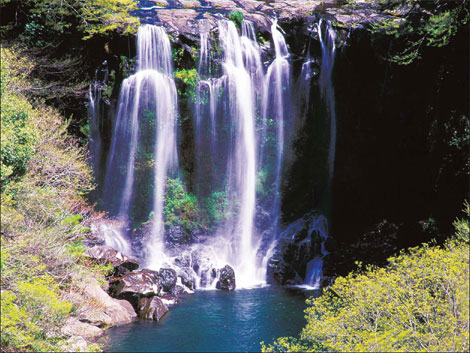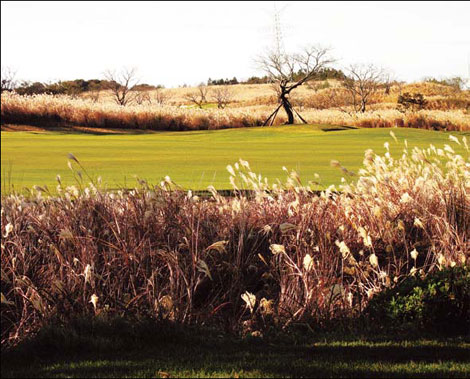Editor's Pick
A break as good as a rest
Updated: 2010-12-16 08:01
By Lin Shujuan (China Daily)
|
Jeju island, a visa-free UNESCO World Natural Heritage site in South Korea, is enjoying increasing popularity with Chinese holiday-makers. Provided to China Daily |
|
The blossoming awn grass defines the landcape of Jeju in winter. Lin Shujuan / China Daily |
A weekend visit to the subtropical South Korean island of Jeju is a great place to recharge the batteries any time of the year, Lin Shujuan discovers
The moment I landed on Jeju island in early December, I felt foolish standing in the 18 C airport, sun overhead and a warm breeze blowing. Having arrived from chilly Beijing, I was sporting a knee-length down jacket, cashmere shawl and a pair of cotton-padded trousers.
Even worse, this was the only outfit I had for the two-day getaway in this visa-free South Korean subtropical volcanic island.
A friend of mine had invited me to take the weekend trip on a Wednesday and before I could think about it and say no, the air ticket reservation was confirmed on my mobile phone. She said this was the best way to convince a workaholic like me to enjoy a break.
Actually, as someone who grew up in a coastal city, I am not really into seaside resorts.
But Jeju, which is becoming increasingly familiar to mainlanders as a holiday destination, thanks to the growing popularity of South Korean TV series, attracted me.
I had heard stories of orange and palm trees, beaches with warm, white sand peppered with black volcanic rock and beautiful ocean vistas. I knew of it also as a honeymoon hotspot for South Korean couples.
Even so, I wasn't looking forward to the sightseeing so much, as learning more about South Korean people and their culture. My only hesitation was the thought that the island would not be as welcoming in the winter as the summer.
|
|
I shouldn't have worried, the trip turned out to be both relaxing and enlightening.
Shopping didn't take up much time as it is mostly confined to the island's three duty-free stores, including the one at the Lotte Hotel Jeju in the Jungmun Tourist Complex.
The stores do not offer a selection of international brands as diversified as one might find in Hong Kong, but they did have a section for cosmetic products made in South Korea that were competitive both in terms of price and quality.
Built upon a cliff close to the beach, the Lotte Hotel and duty-free shop also has a back garden - open free to tourists - leading down to the beach about 100 meters below. It is recommended to take a stroll and enjoy the bird's-eye view.
It turned out I was not far wrong wearing my winter outfit, as we decided to take a yachting trip and there was a strong wind blowing; and at dusk, the temperature dropped to 5 C.
We also tried out typical Korean fare, a barbecue of the locally raised black pigs, a seafood buffet and a hotpot featuring Korean pickles.
The food is generally good, as is the service, but prices are higher than in Beijing. Three pieces of grilled fresh hairtail fish were priced around $26.
The next day, we decided to join other tourists staying at our hotel, to visit a soon-to-be-opened golf resort and villa, before heading to the Green Tea Museum.
The trip took us from north to south, passing Mount Halla, South Korea's highest mountain at nearly 1,950 meters above sea level.
At Arden Hill golf course and villa, at the foot of Mount Halla, we were lucky enough to see the whole of the mountain, the top of which is usually covered in mist.
The blossoming awn grass, the volcanic island's indigenous plant species, defines the landscape of Jeju.
I was told that any property development on the island, listed as a UNESCO World Natural Heritage site, must not completely replace this type of grass.
It was interesting to see how the landscape designer had incorporated the indigenous grass into the construction of a golf resort, using it as dividing fences.
It was not until I returned to Beijing that I realized that I had survived the whole weekend without mobile phone access (my GSM mobile phone isn't compatible with South Korea's CDMA network) or the Internet.
Then I started to wonder how come a place like Jeju has the charm to slow down one's life so easily.
Back in the bright lights of Beijing, I thought the dim streetlights of Jeju might have played a part. The fences made of lava rocks, the friendly smiles of cashiers and their kind suggestions, and the soothing music in the open garden of the Green Tea Museum were also part of the picture.
Then I thought of our driver, a Jeju native in his early 40s, his patience and friendly smile.
I laughed out loud when I recalled how he introduced himself. He didn't speak Chinese, but he managed to introduce himself as a Jeju actor with a name card showing him in one of his recent costume drama extra roles, in the hit South Korean TV series Dae Jang-geum.
This is just one of the numerous extra roles he has played in many popular South Korean TV series shot on the island.
He has collected all his takes, often as short as half a second, and posted them on his blog.
My friend and I both agreed that our driver was a typical Jeju person, but at the time we couldn't work out why, exactly.
It was only while wandering back to my Beijing home, amid a flurry of horns on the busy street, that I realized what this characteristic was - patience!
Specials

President Hu visits the US
President Hu Jintao is on a state visit to the US from Jan 18 to 21.

Ancient life
The discovery of the fossile of a female pterosaur nicknamed as Mrs T and her un-laid egg are shedding new light on ancient mysteries.

Economic Figures
China's GDP growth jumped 10.3 percent year-on-year in 2010, boosted by a faster-than-expected 9.8 percent expansion in the fourth quarter.


